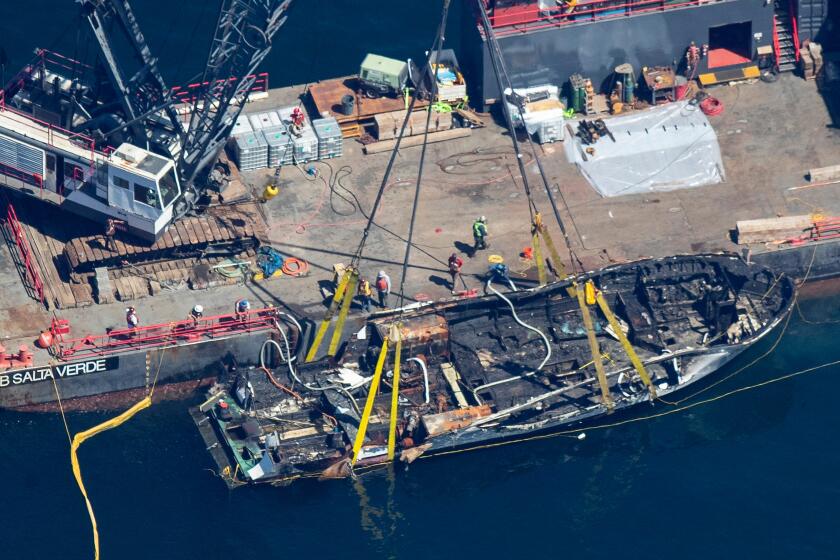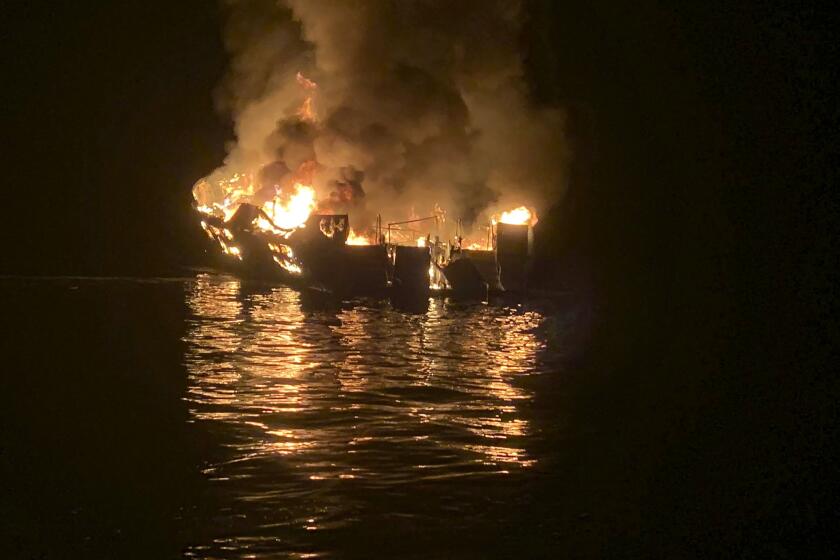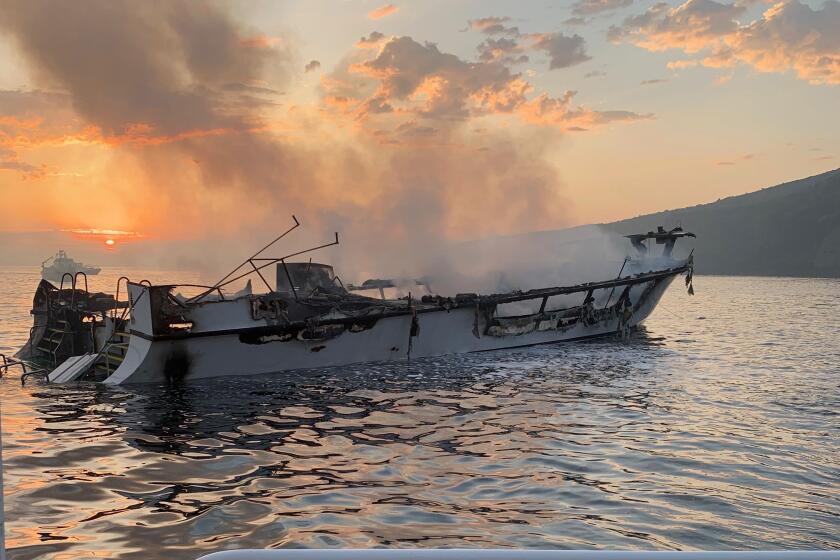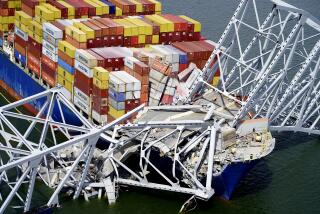California boat fire: Criminal probe launched with focus on safety lapses, sources say
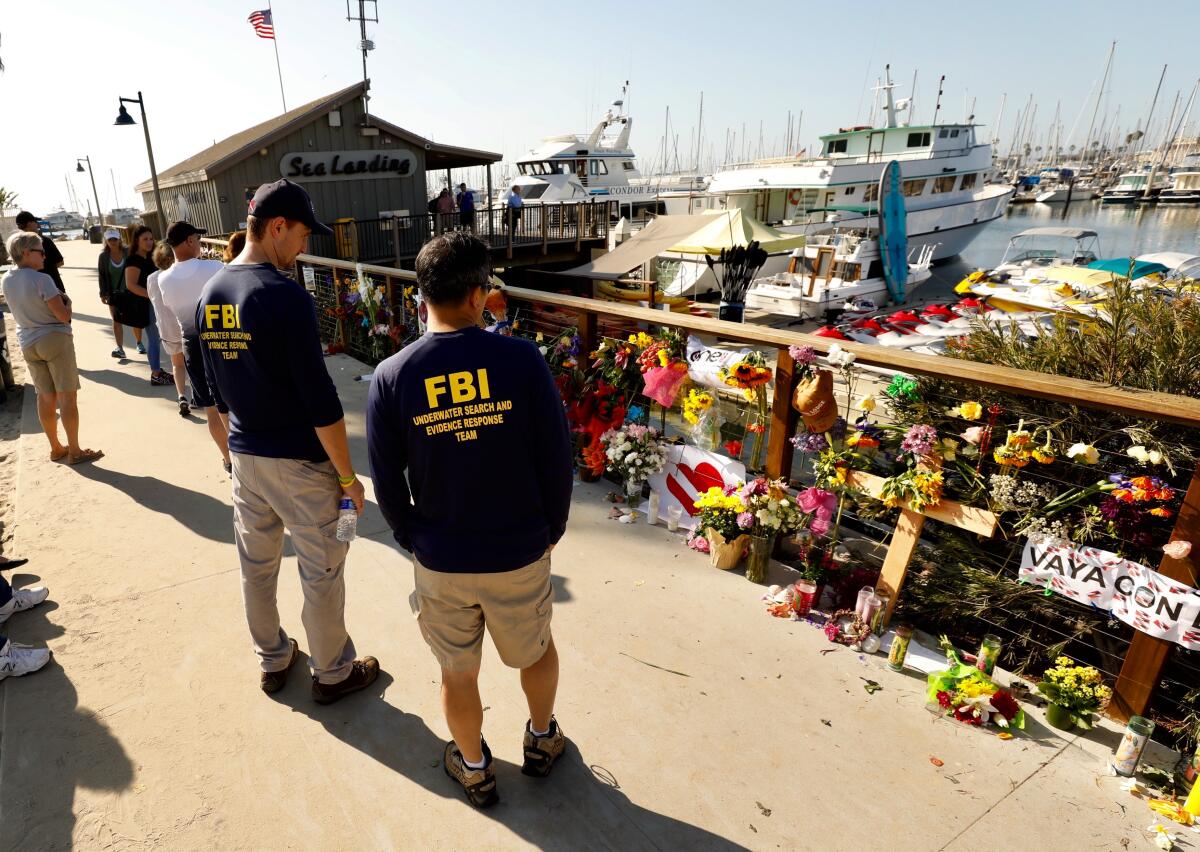
- Share via
SANTA BARBARA — Federal authorities have launched a criminal investigation into the Southern California boat fire that killed 34 people on Labor Day, focusing on possible violations of maritime safety rules, two law enforcement sources told The Times on Monday.
A team of federal investigators from the FBI, the Bureau of Alcohol, Tobacco, Firearms and Explosives, and the U.S. Coast Guard have spent the last two days searching the Santa Barbara Harbor office of the Conception operator, Truth Aquatics Inc. On Monday, they spent more than eight hours examining two of the firm’s other boats, the Truth and Vision.
The probe is being led by the U.S. Coast Guard criminal investigative group under the oversight of the U.S. attorney’s office in Los Angeles, according to one source, who spoke on the condition of anonymity because the person was not authorized to comment publicly.
While the cause of the deadly Sept. 2 blaze off the coast of Santa Cruz Island remains undetermined, investigators have been looking into possible shortcomings in the way the Conception operated.
The fire broke out during a weekend diving expedition, trapping the victims, who were sleeping below deck. Five crew members who were above deck at the time were able to escape and said the fire was too intense to get anyone else out.
Law enforcement sources told The Times last week that a preliminary investigation suggested serious safety deficiencies aboard the Conception. They said the vessel lacked a “roaming night watchman” who remains awake to alert passengers of any fire or other danger; some of the surviving crew members told investigators they didn’t have adequate training to handle a major emergency; and passengers may not have received thorough safety briefings.
A commercial diving boat caught fire near the shoreline of Santa Cruz Island, Calif., early Monday. Many aboard the boat were believed to be sleeping below deck when the fire broke out in the pre-dawn hours.
Documents the investigators obtained have underscored those concerns, one of the sources said.
Investigators are trying to determine whether the Conception was in compliance with the vessel’s certification requirements, which included a series of safety measures.
Prosecutors would ultimately have to decide whether any shortcomings amount to criminal negligence. In recent years, they have increasingly relied on an antebellum federal law dubbed “seaman’s manslaughter” to criminally charge boat operators for people’s deaths.
Last year federal prosecutors in Missouri used the law to charge a duck boat captain and two others in connection with the loss of 17 lives when the amphibious craft capsized in a storm. Prosecutors said the boat’s captain and executives at the company that operated the vessel ignored forecasts that predicted winds that were stronger than the boat was capable of operating in.
The captain is accused of failing to assess the weather, steer the vessel appropriately and prepare the passengers for abandoning ship. Two executives are charged with neglecting to monitor the weather and failing to provide adequate training on the boat. They have pleaded not guilty.
California boat fire: What investigators are trying to uncover
According to two sources, the Conception is now slated to be raised from the ocean floor off Santa Cruz Island and brought to a dock in Ventura, where the ATF’s most experienced team of fire experts will examine the wreck to determine the cause of the fire.
In addition to the criminal inquiry, the National Transportation Safety Board is conducting an investigation that could result in recommendations that have a wider impact on the dive boat industry.
During questioning by the NTSB, the Conception’s surviving crew has speculated that the fire began in the seating area of the galley.
“The galley area was engulfed in flames,” NTSB board member Jennifer Homendy said, recounting what the crew members told investigators. “They tried to enter through the double doors but couldn’t get in because of the flames. They tried to access the galley from the front through the windows, but the windows wouldn’t open.”
A boater who helped the surviving crew members that morning said one of them reported that he thought the fire started in the galley, where cellphones, cameras and other equipment had been plugged in to charge overnight.
A 19th century law could shield the owners of the California diving boat Conception in which 34 people perished from significant damages. But they still face legal hurdles.
The survivors have said the fire was too intense to rescue anyone below deck.
While the seaman’s manslaughter law does not require the captain or crew to go down with the ship, it allows prosecutors to hold them accountable for any misconduct, negligence or inattention to duties that result in a loss of life.
Robert Mongeluzzi, a maritime-law expert who represents some of the Missouri duck boat victims, said the law has a rare legal standard that a defendant needed only act with “negligence” — not “gross negligence” as in common law — to obtain a criminal conviction under the federal code, which carries a penalty of up to 10 years in prison.
Seaman’s manslaughter was passed in 1838 after a series of steamboat disasters killed hundreds of people in fires and boiler explosions.
The law fell out of frequent use, but was resurrected after 11 passengers were killed when a Staten Island ferry crashed in 2003. The pilot and his supervisor were both convicted of seaman’s manslaughter and received prison sentences of 18 months and a year, respectively. Since then, prosecutors have relied on the law to go after crews and operators for inattention to their duties, poor decision-making and carelessness.
California Boat Fire: There is growing focus on the limited escape route on the boat where 34 died in the worst maritime disaster in modern California history
The law applies to ship officers, vessel owners, and corporate management responsible for conduct — including inattention to duty and poor maintenance — that results in death on a vessel within the special maritime and territorial jurisdiction of the United States.
In South Florida, two boat owners were indicted on charges of involuntary manslaughter and providing false information to authorities in connection with the death of a novice scuba diver when a boat sank off Key Largo in 2011.
Aimee Rhoads, 36, a mental-health counselor from Federal Way, Wash., died after being trapped beneath a hard deck cover in a forward area of the 25-foot boat during bad weather. Federal prosecutors allege the boat owners improperly modified the vessel, called Get Wet, contributing to the fatality.
In Maine, a lobster boat captain who had been drinking and using marijuana and oxycodone before he lost two crew members during a 2014 storm was sentenced to four years in prison.
More to Read
Sign up for Essential California
The most important California stories and recommendations in your inbox every morning.
You may occasionally receive promotional content from the Los Angeles Times.
